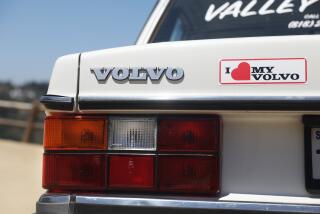Ethical Issues With the Incredible Hulk
- Share via
The only people who seem to like SUVs these days are the ones driving them. Environmentalists, consumer advocates, car safety analysts and even an auto manufacturer have weighed in about the highway hulks, and now ethicists are offering their opinions.
“Environmentalism is the crux of the issue,” says Marianne Jennings, who frequently writes about business ethics for magazines and newspapers and teaches the subject at Arizona State University. “I think we’re going to drive these vehicles right off the road.”
She said she expects environmentalists to “take the car manufacturers to court with a ream of data and questions about law and social responsibility. It’s a highly emotional issue you can’t win on.”
The irony is that Jennings drives a Chevy Suburban, a behemoth among SUVs. With four kids, one of them a wheelchair user, not even a minivan could hold her family. “Sometimes we make choices others don’t approve of,” she says. “Ethics is about responsible choices and full disclosure. The important thing is that we think things through and be honest about our actions.”
*
Jennings has been tracking the SUV debate since 1996 and puts it right up there with tobacco, asbestos and gun issues. The public has been through the latent stage of car analysts and academics publishing complaints and the escalation stage of SUVs making headline news. Now, she says, we’re in the activist stage. Next comes litigation.
Michael Josephson, president of the Josephson Institute of Ethics, a research and education center in Marina del Rey, is a father of four and an SUV owner. “I’m trying not to be defensive,” he says about his Lincoln Navigator. “Life is full of trade-offs. We need to be sensitive to the issues, but we can’t over-moralize.”
Both he and Jennings see SUVs as family cars. “You might have a stronger case against somebody who buys one just because they are in style,” he says. “But I don’t want to see us start pointing fingers, saying, ‘I need one but you really don’t.’ ”
Parents or not, Americans keep buying SUVs even though current high gas prices may mean a full tank costs $75 and detractors have broadly publicized all the issues. SUVs get as few as 10 miles per gallon of gas, 15 or so at the most. They weigh two to three times as much as small and mid-size cars, so there is no doubt who is at greater risk in an accident. And they are classified as light trucks so they are not required to meet the tighter emission control standards set for cars.
Still, there are more than 750,000 of them now roaming Los Angeles, Orange and Ventura counties, according to the Polk Co. for consumer marketing in Southfield, Mich. Sales nationwide have tripled in the past decade, from 1 million in 1990 to 3.1 million in 1999.
But conflicting emotions have led some potential buyers to raise the big question, “Should I or shouldn’t I?” with several professional consultants who aren’t as sympathetic as Josephson and Jennings. “I’ve taken a vow, no chastising,” says Randy Cohen, who writes an ethics column for the New York Times. “I just point certain things out.”
Like?
“If you buy an SUV, you’re buying your safety at the expense of another’s. Hit someone and you’ll kill them.”
Some professional advisors hear the question in roundabout ways. “People ask about consumerism,” says Nathan Tierney, who sees private clients as part of his consulting business, Philosophy in the Real World, in Thousand Oaks.
What starts as a conversation about the pressure to keep up with trends can end in a confessional outburst. “People will say, ‘I want the SUV’ and they’ll say, ‘Life doesn’t have any meaning,’ ” Tierney says. “They don’t put the two thoughts together.” He tries to help them make the connection that possessions don’t automatically lead to happiness.
Tierney cites two points in the SUV dilemma. First there is the conundrum of modern consumerism: “Just because we have the economy and technology to produce SUVs, does that mean we should?” Then there is the desire to be distinct. “The loss of personal relationships in large urban complexes leaves a person looking for identity,” Tierney says. Could owning an SUV be the answer? Maybe for now.
*
The auto industry is banking on sales climbing even higher with new models. Ford Motor Co. recently announced new features, including more stringent emission controls and lighter-weight vehicles in response to auto injury concerns. “Every car manufacturer is busy getting more SUVs to showrooms. They’re betting it’s a strong market,” says Brian O’Neill, president of the Insurance Institute for Highway Safety in Arlington, Va.
Whatever becomes of the SUV, says Jennings, “it’s a great ethical case.” She’ll include it in the fourth edition of her textbook, “Case Studies in Business Ethics” (West Publishing), due out next year.
As for a simple answer, she comes as close to one as an ethicist may get. SUVs are like tanks and tractors in that “there are reasons for some people to own one,” she says. “But do I think everybody should? No.”
*
Mary Rourke can be reached by e-mail at mary.rourke@latimes.com.






